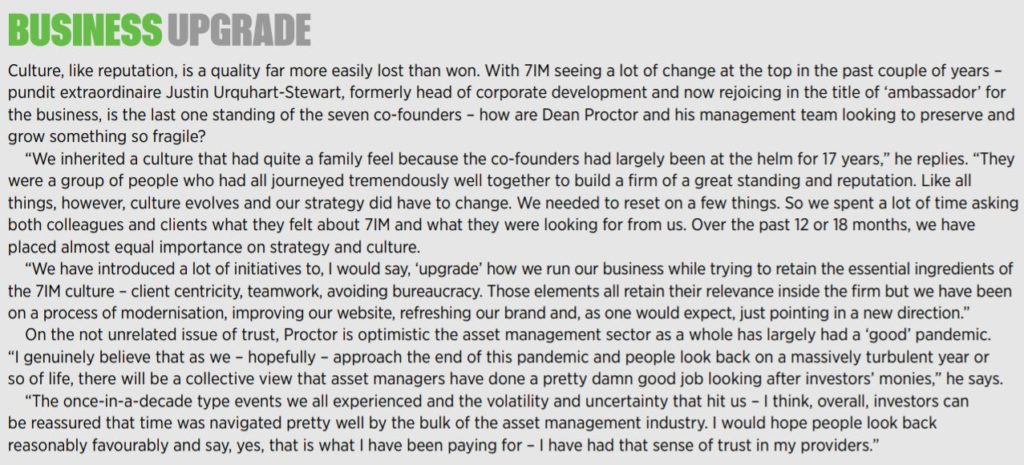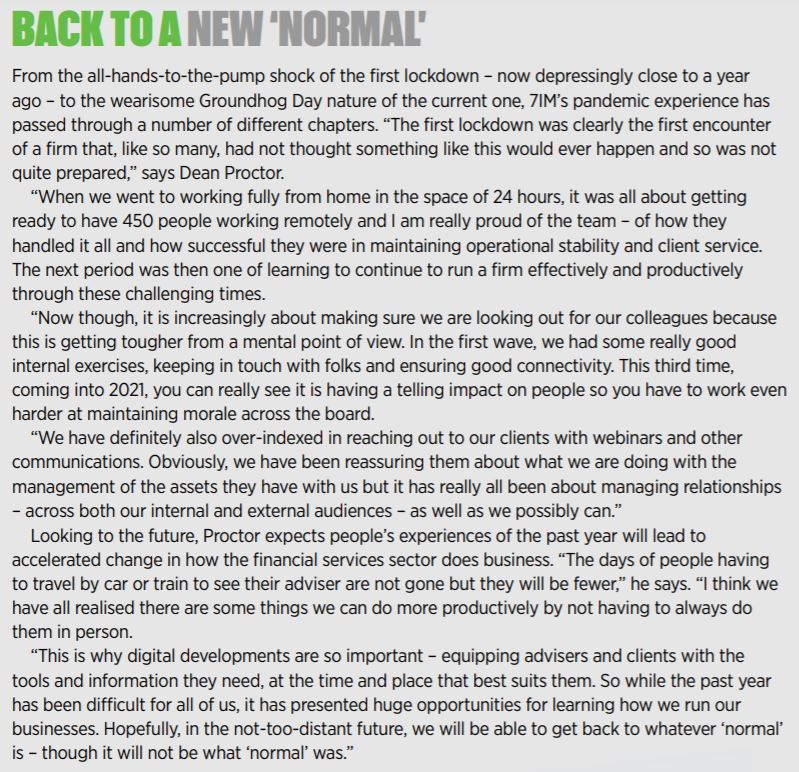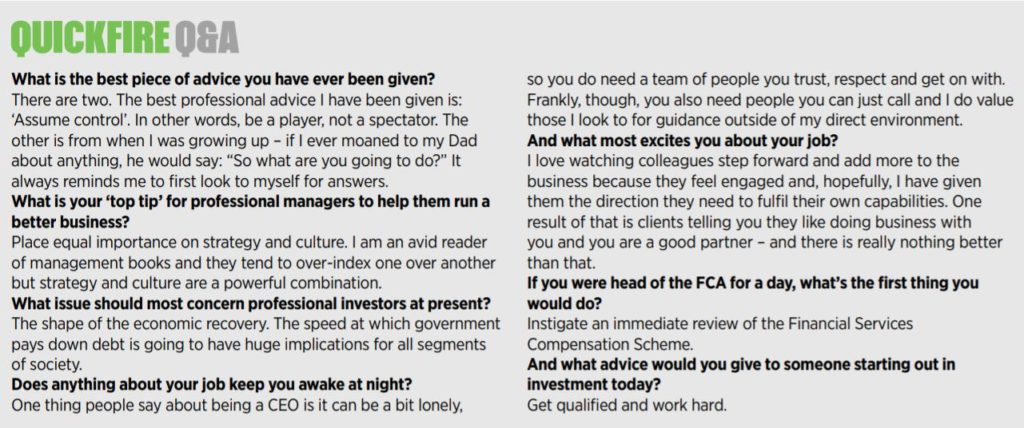Nobody in search of an easy life chooses to be a chief executive – indeed, as 7IM CEO Dean Proctor points out: “The reality is that barely a day or a week goes by when a CEO is not dealing with some crisis or another – so you need to be good at handling all sorts of situations.” Even so, the role must come with one further wrinkle still when you take over the reins from the company’s co-founder.
Moving a business forward while retaining the qualities that made it successful in the first place is a delicate balancing act for any new boss – and is the challenge Proctor took on when he stepped into the shoes of Tom Sheridan in April 2019. Sheridan, along with Barclays Stockbrokers colleague Justin Urquhart Stewart and five others (hence the company’s name), had set up 7IM in 2002 and so held the top job throughout its first 17 years.
“The company was formed principally to serve the intermediary community – and that is still its primary purpose today,” says Proctor, who joined 7IM from Barclays, where he was managing director of the retail bank’s unsecured lending business in the UK. Prior to that he was executive general manager of the Commercial Bank of Qatar and before that CEO of private bank Arbuthnot Latham from 2009 to 2012.
“We are now privileged to look after about £18bn of investments for our clients – and £14bn of that is in partnership with the intermediary community,” Proctor continues. “That is where it all started. There are often three parties – four, if you include the platform – involved in a client relationship but the intermediary is the primary point of contact for the end-client and the asset manager is secondary.
“The principles on which Tom and Justin established the firm – transparency, putting the client first, openness around our charging structure, trying to demystify the complexities of our industry so advisers and investors can understand exactly what it is they are paying for and receiving as part of a service – these all still ring true today and they still sit at the heart of what we are.”
Picking up on one of those principles – openness around charging – Proctor highlights the work of the Financial Conduct Authority (FCA) on assessment of value reports as an important initiative. “The key word for me now in this space is consistency,” he continues.
“This has been going on for a year or so and, to some degree, we may see companies taking their own direction with the reports.”

Demonstrating value
“Quite possibly the regulator will need to apply further standards so we are all reporting in a way that enables the users of these reports to do like-for-like comparisons. Obviously tools do exist to help advisers here but, at the moment, it would not be the easiest of tasks. Furthermore, asset managers need to demonstrate value across different metrics so it is not just about inflation-plus or above-benchmark performance.
“It also has to be about ensuring there is an awareness of the service that sits behind the performance – how risk, volatility, liquidity and so on is managed. From our own web traffic, we can see some advisers have clearly already engaged and are using the assessments in their reports, considerations and advice process. That should gather pace over the next few years as we see greater consistency in how asset managers report on value.”
Nor is it just the early adopters who have been scrutinising assessments of value. “Competitor reports have enabled us to look harder at our own funds and to answer questions such as whether our annual management charges are positioned appropriately,” says Proctor. “Again, the relevant data points already existed but we have certainly found these reports a good comparator for our analysis.”
Chalk up one for the FCA then but, more broadly, does Proctor believe the regulator is striking the right balance between protecting investors and allowing asset managers to do their job? “Having also worked outside of the UK, I know the FCA is highly respected overseas and a lot of its policies are seen as best-in-class and copied in other territories,” he begins carefully.
“Still, as the primary responsibility of asset managers has to be to act in the best interest of our investors, that needs to be a key line of questioning for the FCA and, frankly, there are a couple of areas that need to be looked at quickly. Chief among these is the Financial Services Compensation Scheme. It is not working and it needs a review – and soon.
“It is an urgent requirement for our industry to get this right as it can feel as if the companies that are operating with good governance are suffering the most. Also, following on from what I said about the assessment of value reports, customer-led service standards are something financial services companies really need to consider in conjunction with the regulator. Those would be my primary concerns.”
Always evolving
When it comes to the contents of client portfolios, 7IM has tended not to shy away from new ideas, entering the multi-asset market in 2003, launching its first ethical fund in 2007 and, a year later, using passive funds to implement an active approach to allocation.
“We deliberately offer active and passive options because advisers and clients both look for different solutions based on different sets of objectives,” says Proctor. “We have spent the past 18 months expanding our passive range, across funds and models, to complement an already long-established range of active solutions. Indeed, we are increasingly seeing clients blend active and passive in the search for security and protection. There is a cost element to this, although the past 12 months have increasingly proved active management can really add value beyond a passive portfolio.”
That period has also highlighted the need for investors to look beyond equities and bonds, Proctor believes. “We can all see where volatility has been biting away and the lack of returns in some areas, such as bonds,” he says. “We have incorporated a sophisticated alternative investment structure within our portfolios for some time now – and 2020 absolutely underlined the value of that rather than being wedded to just two or three asset classes.”
As for environmental, social and governance (ESG) considerations, Proctor says 7IM has spent “a good 12 months or so looking at our credentials here” and the actions it now should take, both as an investor and a business.
“We have signed up to the UN’s Principles for Responsible Investment and will submit our second return in March,” he continues. “Our plan of action now is to embed ESG principles throughout our investment portfolios – initially with the launch of ESG models. We will have those models available for our advisers and clients in the middle of February and then – and this will be a multi-year exercise – we will ensure ESG steadily becomes engrained in everything we do from an investment management process.
“That cannot simply be done with the flick of a switch, however – it needs to be brought about sensibly and over time as we review and rebalance portfolios. Then, to make sure we are not looking at ESG through a single lens, the way we invest will be complemented by an evolving corporate social responsibility strategy to ensure 7IM is also being run appropriately as a business.”

Asset management is overdue a tech-led disruption
Speaking of flicks of switches, technology is an area where 7IM has often proved itself ahead of the crowd – helping to pioneer the idea of wraps in the UK in the early 2000s, for example, while, with ‘7Imagine’, it was one of the first asset managers to offer clients a serious app – and the experience of his previous jobs means Proctor has no intention of allowing 7IM to rest on its laurels.
“I spent a huge chunk of my professional life in banking and saw how technology changed the sector,” he says. “That was particularly true for consumer banking and I do believe the asset management arena is overdue a technology-led piece of disruption or advancement. So there is still plenty to do in a world where the shift to digital will only accelerate – not least because of where we have all been working from during the pandemic.
“As a business, we have invested significantly into our platform capabilities in the past 12 months and we have a clear roadmap for the next 12 to 18 months.
“At an adviser level, I am absolutely sure more and more client interactions will be a combination of human and digital but, for that to happen, digital capabilities need to be enhanced. Anybody leading any firm in any sector who does not see technology at the top of their agenda is not thinking clearly.”
Alongside technology and sustainability, the other issue to the forefront of Proctor’s thinking on the future, for 7IM in particular and the financial services sector in general, is how the government plans to pay off the huge amount of debt it has built up – and how that will impact consumers. “Somebody has to pay down that bill and there will inevitably be changes and challenges for the more affluent in society,” he reasons.
“Asset managers will continue to have a crucial role here but, as I say, they will be secondary to the relationship between advisers and clients, who will require great advice at the front end, a clear understanding of tax changes and so on. We should see more and more interactions taking place digitally and fewer face to face – and, if that is not achieved, then frankly the industry cannot move forward.
“There is more demand for financial advice than existing advisers can supply and we need to make sure we can respond to that. It is not just about more advisers – there must also be more process efficiencies and digital interactions. Asset management is increasingly being challenged on price and commoditisation and we must adapt in the interests of the end-investor. Those businesses that can evolve and modernise are the ones that will ultimately be successful.”











